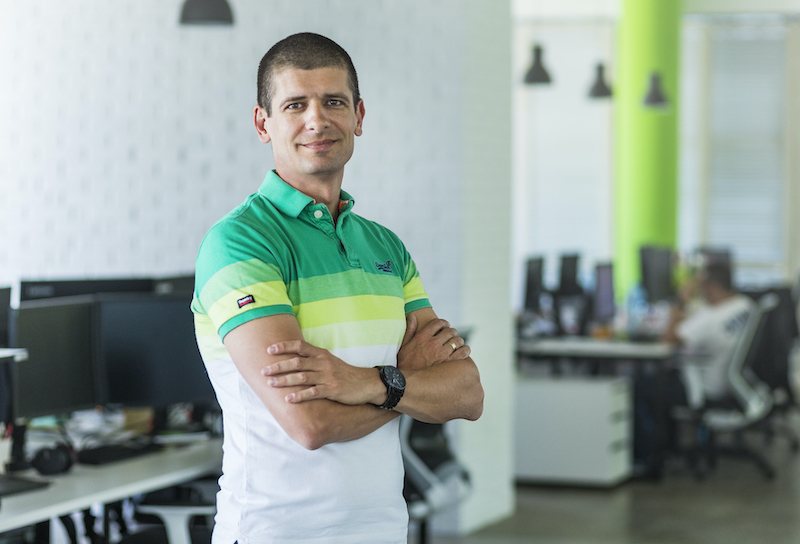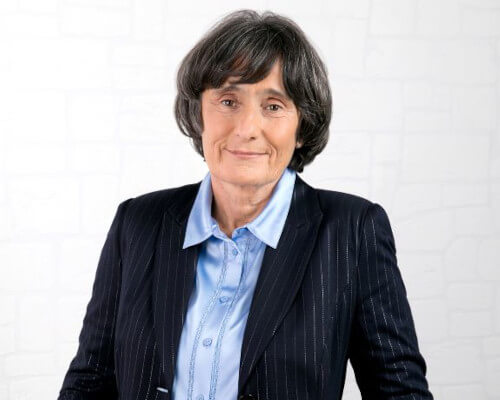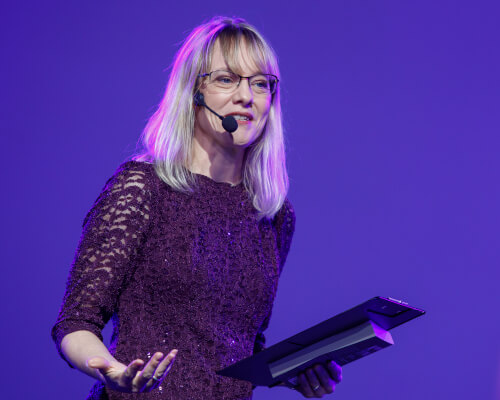
For the past 20 years Svetozar Georgiev has proven that success is possible in Bulgaria. What it takes is hard work, persistence, and willingness to share the fruits of your labor. In 2002 Svetozar founded, along with Boyko Iaramov, Vassil Terziev, and Hristo Kosev, software company Telerik and within several years transformed it into a leading developer of software products and application development platforms worldwide. After Telerik was acquired by US company Progress Software in 2014, Svetozar dedicated his efforts to helping other Bulgarians succeed in their home country as well—through educational projects like Telerik Academy and Telerik Academy School, offering tech education to people of all ages, and endeavors like Campus X, a hub for startups, established companies, and entrepreneurial talent.
In 2020, Svetozar joined other contributors to the United against COVID-19 Emergency Response Fund in supporting communities affected by the coronavirus in Bulgaria. Established by the Bulgarian Donors’ Forum, America for Bulgaria Foundation, US Embassy, and American Chamber of Commerce in Bulgaria, the fund supported 112 hospitals, municipalities, civil society organizations, and small and micro businesses, reaching more than 700,000 people across Bulgaria. We interviewed Svetozar for the ABF newsletter to find out more about his giving philosophy, his role in supporting the development of Bulgaria’s IT community, and his impressions of how business is faring during the pandemic.
America for Bulgaria Foundation (ABF): You invest a great deal of energy and time in supporting other people on the path to success—as a mentor to aspiring entrepreneurs, an investor in Telerik Academy and Campus X, and a donor to your alma mater, the American University in Bulgaria. You did not remain indifferent to the fate of small towns affected by the coronavirus crisis either. Who or what has been most influential in shaping your giving philosophy?
Svetozar Georgiev (S.G.): It is difficult for me to name a single influence or something that has played a big role. It is something that builds up over time although certainly character, upbringing, and environment play a role. There is a saying that giving is more satisfying than receiving. I certainly think so. Again, together with my colleagues and with my closest people, with whom we started and went through the Telerik journey, we have always been driven by the thinking that it is better to share, that we shouldn’t be greedy for the big prize now, that it is best to look ahead, and that in order to receive, you must give first. This is the purely pragmatic aspect. The emotional aspect is that when people around me succeed—children, friends—I am even happier than when the achievement is mine. The satisfaction you get from personal success is fleeting. Education is the best example of how you can help others in a meaningful way. As the saying goes, it’s better to teach someone to fish than to give them a fish. It is extremely satisfying when we manage to change the life of a child for the better or to help people find a more promising career in Bulgaria.
What we always try to convey to those we are helping is that they need to do the same for others. If they pass the baton to others, then the effect of all this will be greater. Otherwise, if there is just one small group of mentors helping out, they will always remain just a small group. When this group grows and passes on these values, reinforcing them, then miracles really do happen. In reality, this is a core value in the Campus X community. We say quite openly to everyone who comes to us that we want absolute openness and that what you know, what you do well—you should share it with others. In reality, we are not competitors, and together we will succeed more easily. If you are good at something, you will help someone else, and that person will be better at something else and will help you. This way, we all become better than if we relied only on ourselves. Things start to build up from there.
ABF: To this day, you work with classmates of yours from the American University in Bulgaria. Is this where it all started “building up” for you?
S.G.: The time you spend at a university is life-changing, especially if it is a small place like the American University in Bulgaria (AUBG). My class had only 100 people; we knew each other well and keep in touch to this day. You always know what to expect from AUBG graduates in terms of thinking and attitude. When we at Telerik used to hire graduates of the university, we knew that they would come to us with good skills. Occasionally there might be gaps, but we would fill these. When you know that the attitude is right, there is no way it won’t work. This is way more important [than skills]. The university gave me the right attitude. The first truly meaningful community that I have encountered was the AUBG community.
ABF: You mentioned the word “community” several times, and it crops up frequently in your interviews and public addresses, in which you highlight the importance of creating a community in the IT sector, but not just there. What do you mean by “community,” and why is it so important?
S.G.: A community is driven by higher, loftier goals and values than the everyday business goals that members pursue. The basic idea is that if we help each other to become better collectively, our success will be greater, in a larger market. We often talk about this with companies in the startup ecosystem and especially in IT. There is, of course, competition there, mainly for talent, and secondly for business, but this ecosystem is very cohesive, and the trade groups and associations here work very well, ever better. I watch them, as we are a member, and I see this thinking everywhere: Let’s succeed together and not compete with each other in the small arena that is Bulgaria. Let’s become competitive as the Bulgarian community in the Balkans or even globally.
This is what I mean by community—being united by a common goal and, most of all, the attitude that together we will succeed and do it better than we would individually.
ABF: Is this thinking specific to the IT sphere, or do you think it can be cultivated in the wider community?
S.G.: Not all companies we work with are in the IT sphere. This thinking isn’t confined to an industry. It builds up; good examples build up. We learn from and inspire each other… If we look back at where we were ten years ago, there wasn’t anything at the time—no ecosystem, no community. Not to mention where we were twenty years ago, when we launched Telerik. It was like the Stone Age; there was absolutely nothing in the way of attitudes or conditions, but things started working out little by little.
ABF: Why did you choose to support the United against COVID-19 Response Fund?
S.G.: It is very important that the organizations or people you are supporting can use the funds well and that they achieve the desired effect. I deeply respect the organizations that launched this initiative, and I believe in them, having worked with both the Bulgarian Donors’ Forum and the America for Bulgaria Foundation. This also gave me confidence that these funds would be well managed and spent and that an optimal effect would be achieved. And when that’s the case, when I am dealing with that kind of organization, I’m calm and feel good, even though I do not have direct oversight.
The same goes for startups. It is not OK for an investor, angel, or mentor to get involved at the operational level. Here and there it might be necessary, either during a crisis or in a moment of great opportunity, but there must be a clear beginning and end; it cannot be continuous. For an organization to be healthy, it must have the people and management team to move forward on its own. A mentor or investor can help define a strategy, attract the right people, but that’s it. He should not have to be an operator.
ABF: What impressed you the most in the public’s reaction to the coronavirus outbreak in Bulgaria?
S.G.: I was really touched when, I think it was, Alexandrovska Hospital issued a call for volunteers, and a staggering number of people answered it. This was phenomenal. No one can really imagine what it is like for the doctors and other people on the front lines.
ABF: The coronavirus outbreak created many difficulties for business but also inspired innovative people and companies to work on solutions for dealing with the crisis. Any interesting collaborations or solutions that you have invested in arising out of the crisis?
S.G.: Alongside the many challenges that crises throw in everyone’s path—businesses and people—they are also a time when we are forced to rethink everything we do. For the fighters among us, for those who have their eyes open, crises, in my opinion, are character building. These companies come out stronger after the crisis is over. Because crises serve as a restart button—that is, you may have had certain advantages before them, but these might be diminished or taken away. Companies and entrepreneurs that keep on their toes have an opportunity to pull ahead faster and on a larger scale than if there had been no crisis. Crises are a great chance to rethink what we do in our day-to-day operations. Suddenly, it turns out that some things that required significant resources before can happen faster now, with fewer people and less money. In the end, despite the terrible human and business cost that this crisis will have, it will restart many processes and will bring people, businesses, and the entire country out of their lethargy and will be a new start for all of us.
The coronavirus crisis has given rise to interesting projects and pivots in some companies. A few companies have considerably changed their products or developed solutions that are very relevant at the moment in that they are helping people and businesses resolve their current challenges, which are different from the challenges they faced six months ago. Your company’s regular product may not be as relevant at the moment, or your customers may have other concerns, so you might say to yourself: Let me see if I can do something about these other concerns with the technology and knowledge I have. Very often, it turns out you can do a lot. You can be helpful in overcoming the crisis, which will help you gain customers and customer love, and from there, as things calm down, you can use that customer love to sell the original idea you had.
There are companies that are very interesting. One of them deals with 3D bioprinting, and its goal is to reduce the complexity of testing therapies, to make them more personalized, so that new drugs reach people faster. Another company is struggling with another topical challenge right now—it is trying to figure out how to accelerate clinical trials and recruit people for clinical testing more effectively.
Another important area, which is in danger of becoming less of a priority amid the Covid-19 crisis, is everything related to green living. There are companies based in Bulgaria making extremely interesting products that are world-class. There are a few of these companies actually. These are the areas that are very important. At the moment, the European Union is channeling a lot of funds into the so-called Green Deal and is trying to sound the alarm with a clear message: The momentum we have gained toward sustainable development and living and environmental protection should not be paused for two or three years, while we are dealing with Covid-19, because it will be very difficult to restart the process afterward, both politically and in practice.
All that being said, it’s not all about how good the product or the team is. Currently, some industries and activities have been hit very hard, very directly, while others are less affected and will recover faster.
ABF: What investments of yours do you consider more important—the financial investments or the time you spend mentoring companies and people?
S.G.: When you are an angel investor, your financial help isn’t as important as the expertise you share. This is the main goal. Money is just a way to give you a direct reason to share the most of your experience and to gather as good a team as possible, because then the return for you will be greater than the original investment. But this is not the primary goal. It is to share your experience and knowledge and help the team succeed, which brings a lot of satisfaction—seeing that you have passed on knowledge to someone else and that they have succeeded as a result. It’s reciprocal almost every time: I also learn a lot from the teams, from the people. It is mutually enriching.

